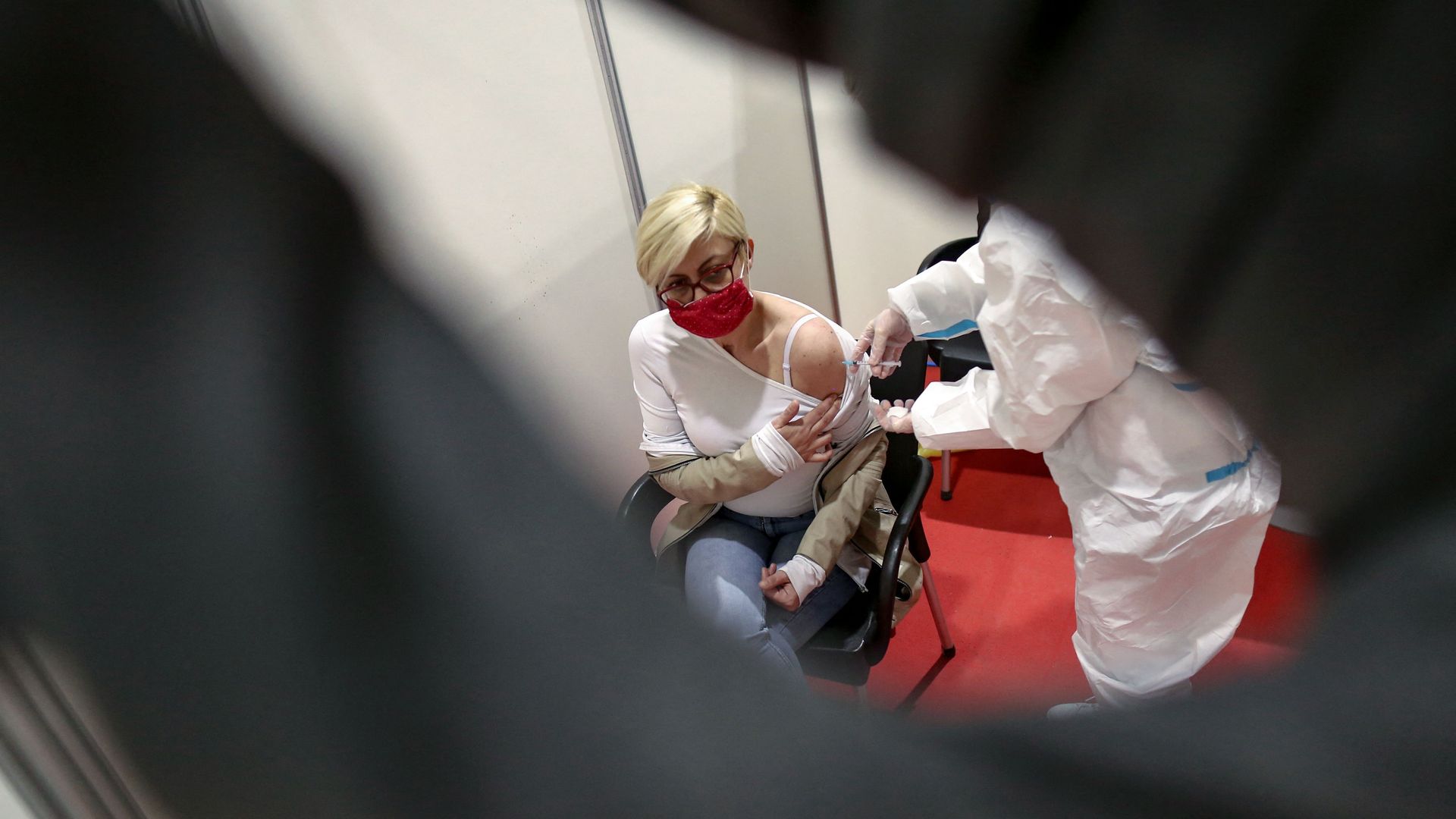| | | | | | | Presented By The U.S. Global Leadership Coalition | | | | Axios World | | By Dave Lawler ·Jun 24, 2021 | | Welcome back to Axios World. - Tonight's edition (1,621 words, 6 minutes) starts in Afghanistan.
- Heads up: I'll be on vacation next week so World will be in the capable hands of my colleague Zach Basu.
Just arriving? Subscribe. | | | | | | 1 big thing: Afghan visit tinged with impending disaster |  | | | An Afghan soldier stands guard at a mosque in Kabul. Photo: Wakil Kohsar/AFP via Getty | | | | As Afghan President Ashraf Ghani was making his way to Washington to meet with President Biden, the WSJ revealed that the U.S. intelligence community believes his government may be toppled within six months of America's withdrawal. Why it matters: As the Taliban gains territory and the U.S. pulls its remaining forces out, hopes of a potential peace deal in Afghanistan are giving way to fears of a rapid Taliban capture of Kabul. Driving the news: Ghani will arrive at the White House tomorrow seeking assurances that the U.S. will keep up its diplomatic push for a peace deal and financial support for the beleaguered Afghan military, says Michael Kugelman of the Wilson Center. - The atmosphere leading up to his trip could hardly be more foreboding, with a stream of reports describing checkpoints, towns and U.S.-provided military equipment falling into Taliban hands.
- "The combination of large amounts of territory seized, the capture of a border post with Tajikistan and all of these surrenders coming in — it's sort of like a perfect storm of successes for the Taliban" that has the makings of an "unprecedented assault," Kugelman says, though he notes that Afghan security forces have recaptured some ground.
- "It's just a matter of how far the Taliban is willing to go and to what degree certain mitigating factors — like continued financial assistance to the Afghan military — prevent it from doing what many fear it'll be able to do in just a matter of months," he adds.
The big picture: When Biden announced that all U.S. forces would depart by Sept. 11, he never claimed to be leaving behind a stable Afghanistan. But now he has to contemplate a scenario akin to the fall of Saigon in 1975. - It emerged today that the administration is planning to evacuate thousands of Afghans who worked with the U.S. military and could now be targeted by the Taliban, but no detailed plan has been released.
- The administration has warned that the Taliban won't receive international aid or recognition if it attempts to take Kabul by force, and argued that the group should thus seek a power-sharing deal.
- But the Taliban says it won't talk until all foreign troops are out, and offered little indication that international legitimacy is a primary concern. In the meantime, it's strengthening its position by the day.
What to watch: Ghani arrived in Washington along with Abdullah Abdullah, his top political rival and also the government's representative for intra-Afghan peace talks. - They will aim to convey a "unity of purpose to try to ease concerns in Washington that you've got a disunited, dysfunctional Afghan government," Kugelman says.
- Even with the Taliban gains, though, the White House has remained committed to a full withdrawal by September.
|     | | | | | | 2. Data du jour: What the pandemic has done to us |  | | | Illustration: Aïda Amer/Axios | | | | Early in the pandemic, people in Canada, Japan, South Korea and several other countries surveyed by Pew tended to think the crisis was bringing their countries together. - Now, across the board, majorities believe their countries are more divided than before, including 88% in the U.S, 83% in the Netherlands and 77% in Germany and Spain.
By the numbers: There's an interesting split among the 17 wealthy countries surveyed in terms of their retrospective views on pandemic restrictions. Here's how it breaks down (most popular answer shown). - Should have had more restrictions: Japan (62%), U.S. (56%), Canada (53%), U.K. (50%), Spain (46%), France (40%), Germany (37%).
- Should have had fewer restrictions: Greece (43%).
- Restrictions were about right: New Zealand (80%), Taiwan (78%), Australia (68%), Singapore (57%), Sweden (51%), Italy (46%), Netherlands (46%), South Korea (46%), Belgium (41%).
Worth noting: In nine of the 10 countries polled in both 2020 and 2021, approval of the national pandemic response has trended downward, most dramatically in Germany (88% approval in 2020 vs. 51% in 2021). - The exception is the U.K., where a successful vaccine rollout has buoyed national pride.
|     | | | | | | 3. Bosnians face vaccine dilemma |  | | | A Bosnian citizen gets vaccinated in Belgrade. Photo: Oliver Bunic/AFP via Getty | | | | Residents of Bosnia and Herzegovina are desperate for vaccines, but a promise of help from Serbia has left them with a dilemma: receive a vaccine from a former enemy or wait months to get one at home, Axios fellow Teodora Trifonova writes. Driving the news: Serbian President Aleksandar Vucic announced earlier this month that residents of Bosnia and Herzegovina would be able to receive free vaccinations in Serbia. Bosnia is otherwise relying on donations and the WHO-backed COVAX initiative. So far just 7.6% of the population has had even one dose. - It is estimated that more residents of Bosnia and Herzegovina have now been vaccinated in Serbia than in their own country, says Bosnian journalist Mladen Obrenovic, who has been covering the pandemic.
- But some refuse to go. "I can assume that the reasons are related to the war," Obrenovic says.
The big picture: Around 100,000 people were killed during the Bosnian War (1992-1995). More than half those killed were Bosniaks, many of whom were victims of ethnic cleansing by Serb forces. What they're saying: Dzeneta Saric says she was 10 years old when her father was "killed in captivity by Serbian soldiers." - "But I had no choice now but to get vaccinated in Serbia," she tells Axios.
- Saric traveled more than 5 hours by car from Sarajevo to Novi Pazar, Serbia for her Pfizer shot. She might otherwise have had to wait until next year, she says, a risky proposition since her work as a journalist requires frequent in-person interactions.
The other side: Imran Bezdrob, who at 23 is too young to have experienced the war, compared getting vaccinated in Serbia to switching teams in a football match. - "I see a lot of people are going to Serbia to receive the vaccine. For me it is not OK," he tells Axios. "I think it would be better to wait in my country and to have a shot in my country."
|     | | | | | | A message from The U.S. Global Leadership Coalition | | Foreign aid: what's it worth? | | |  | | | | The global COVID-19 pandemic made it painfully clear what happens abroad matters at home. Engaging around the world protects the interests of Americans. Here's how: Diplomacy, development and global health investments help make America safer, healthier and more prosperous. Learn more. | | | | | | Bonus: Where in the World |  | | | Screengrab via Apple Maps. | | | | I'm visiting the world's most populous island (marked with a red pin), home to 148 million people. Can you name it? Scroll to the bottom for the answer. |     | | | | | | 4. China news roundup: Scrutiny over Xinjiang | | Just about every time the UN Human Rights Council convenes, countries sign dueling statements criticizing and defending China's mass detentions in Xinjiang, offering a fascinating gauge of where the world stands. Driving the news: The critical bloc, led by Canada, grew this week to 45 countries from 39 last year and 22 in 2019 (among the new signatories were the Czech Republic, Israel and Ukraine). - China claims the supportive bloc jumped to 65 countries, from 45 last year and 37 in 2019 — but this time around neither Beijing nor its sponsor, Belarus, released a list.
- Between the lines: It's a lot easier to sign such a statement anonymously.
More headlines: 1. Axios' Barak Ravid has an interesting report on how the Biden administration convinced Israel to break with recent policy and sign the statement criticizing China. 2. The Biden administration today banned imports of solar materials from a Chinese firm accused of using forced labor in Xinjiang, Axios' Yacob Reyes writes. 3. Organizations performing supply-chain audits in China to determine whether forced labor was used have faced harassment and even detention from Chinese authorities, Axios' Bethany Allen-Ebrahimian reports. 4. Tensions between the U.S. and China are complicating global scientific collaboration, Axios' Alison Snyder reports. Go deeper. |     | | | | | | 5. Israel: So hard to say goodbye | | It has been 11 days since Benjamin Netanyahu was removed from office, but he's still clinging to the prime minister's residence and title, and stressing that he'll be back soon, Axios' Barak Ravid writes. Why it matters: Netanyahu continues to claim Israel's new power-sharing government is the result of "fraud." Meanwhile, some Netanyahu allies continue to refer to him as prime minister. In one meeting of Netanyahu's right-wing bloc, Shas party leader Aryeh Deri accidentally referred to Netanyahu as "Mr. Prime Minister." - When Deri began to correct himself, Netanyahu replied wryly: "Don't fight it. You can call me your highness."
Behind the scenes: After Prime Minister Naftali Bennett was sworn in, he said he would give Netanyahu time to move out of the official residence on Balfour Street in Jerusalem. - A day later, Netanyahu received former U.S. ambassador to the UN Nikki Haley (who also referred to him as "Prime Minister") at the residence.
- Protesters later turned up outside the residence with a moving truck, but Netanyahu continued to insist he needed several weeks to pack.
- On Saturday, Bennett's office announced that Netanyahu had agreed to leave the residence on July 10, a month after the end of his term, and not to host any more meetings at the residence.
Flashback: When his first term ended in 1999, it took Netanyahu six weeks to leave the official residence. When he was elected again in 2009, his predecessor Ehud Olmert cleared out after only four days. |     | | | | | | 6. Friend of the devil, foe of the penguin? |  | | | Photo:De Agostini/Getty Images | | | | What started as a rescue mission for Tasmanian devils has led to devastation for miniature penguins. This "only in Australia" story from Axios' Ivana Saric begins with a sad fact: a transmissible facial cancer has been causing populations of the endangered Tasmanian devil to dwindle. How it happened: 28 of the feisty marsupials were moved to a small island in hopes that they would flourish there. But the island was already home to thousands of small penguins. - The good news: The devils are indeed thriving, with the population climbing to 100 after just four years, per the Guardian.
- The bad news: The penguins have disappeared. Fortunately there are still significant populations on nearby islands.
|     | | | | | | 7. Stories we're watching |  | | | Taking a swing on the Huser Plateau in Turkey. Photo: Ali Kemal Atik/Anadolu Agency via Getty | | | - Duterte threatens to jail people who refuse COVID vaccine
- India sets vaccination record
- U.S. fears drone threat from Iran proxies
- Gaza ceasefire under strain
- Khashoggi killers reportedly trained in U.S.
- EU launches Google antitrust probe
- Hong Kong's Apple Daily sells 1 million copies of final edition
Quoted: "There is no hunger in Tigray." — Ethiopian Prime Minister Abiy Ahmed to the BBC. The UN says there is a famine in the war-torn region. |     | | | | | | A message from The U.S. Global Leadership Coalition | | The world has changed | | |  | | | | America can't ignore what happens outside our borders. Investments in diplomacy, development and global health help the U.S. stand with our allies, open new export markets, get more Americans back to work and prevent the next pandemic from reaching our shores. What's it worth? Everything. | | | | Answer: I'm visiting Java, Indonesia. |  | | The tool and templates you need for more engaging team updates. | | | | | | Axios thanks our partners for supporting our newsletters. If you're interested in advertising, learn more here.
Sponsorship has no influence on editorial content. Axios, 3100 Clarendon Blvd, Suite 1300, Arlington VA 22201 | | | You received this email because you signed up for newsletters from Axios.
Change your preferences or unsubscribe here. | | | Was this email forwarded to you?
Sign up now to get Axios in your inbox. | | | | Follow Axios on social media:    | | | | | |










No comments:
Post a Comment